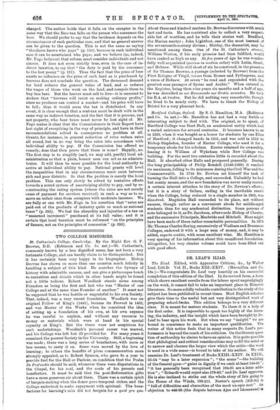Hertford College, Oxford. By S. G. Hamilton, M.A. (Robinson and
Co. 5s. net.)—Mr. Hamilton has not had a very fertile or interesting subject to deal with. The original, so to speak, of Hertford College was Hart Hall, an academical entity which had a varied existence for several centuries. It becomes known to us in 1283, when it was bought as a house for students by one Elias of Hertford ; it changed hands in 1301, and was sold in 1312 to Bishop Stapledon, founder of Exeter College, who used it for a temporary abode for his scholars. Exeter retained its ownership, leasing it to William of Wykeham while New College was building. For the next two centuries little is recorded about the Hall. It absorbed other Halls and prospered generally. During the long principalship of Philip Rondell (1548-1599) it reached its maximum, falling to its minimum during the Civil War and the Commonwealth. In 1710 Dr. Newton set himself the task of turning the Hall into a College, and succeeded. Unluckily he had but scanty means, and the new foundation was never really rooted. A certain interest attaches to the story of Dr. Newton's efforts ; but it is a story of failure, ending in the inevitable result when the College, being reduced to a single member in 1805, was dissolved. Magdalen Hall succeeded to its place, not without success, though rather as a convenient abode for middle-aged students than for any academical distinction. Some persons of note belonged to it, as Dr. Jacobson, afterwards Bishop of Chester, and the successive Principals, Macbride and Mitchell. More might have been made of these rather remarkable personalities. In 1874 Mr. Thomas Charles Baring, successively of Wadham and Brasenose Colleges, endowed it with a large sum of money, and, it may be added, experto credite, with some excellent wine. bar. Hamilton is very sparing of his information about this munificent foundation. Altogether, his very slender volume could have been filled out with good effect.


























































 Previous page
Previous page